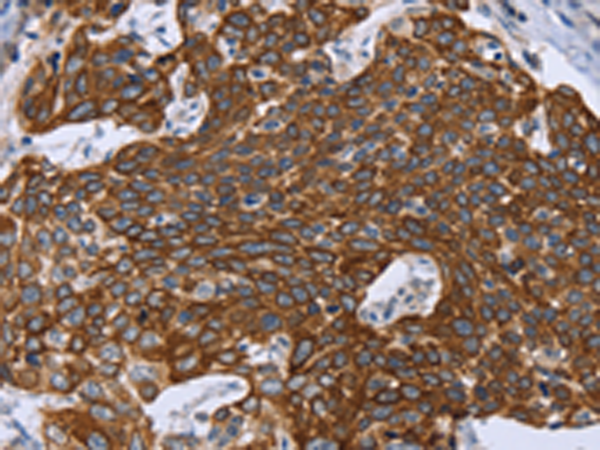


| WB | 咨询技术 | Human,Mouse,Rat |
| IF | 咨询技术 | Human,Mouse,Rat |
| IHC | 1/50-1/200 | Human,Mouse,Rat |
| ICC | 技术咨询 | Human,Mouse,Rat |
| FCM | 咨询技术 | Human,Mouse,Rat |
| Elisa | 1/2000-1/5000 | Human,Mouse,Rat |
| Aliases | BB2 |
| WB Predicted band size | 43 kDa |
| Host/Isotype | Rabbit IgG |
| Antibody Type | Primary antibody |
| Storage | Store at 4°C short term. Aliquot and store at -20°C long term. Avoid freeze/thaw cycles. |
| Species Reactivity | Human, Mouse, Rat |
| Immunogen | Synthetic peptide of human GRPR |
| Formulation | Purified antibody in PBS with 0.05% sodium azide and 50% glycerol. |
+ +
以下是关于GRPR抗体的3篇文献示例(内容为虚构模拟,仅作参考):
1. **《Targeting GRPR in Prostate Cancer: A Novel Monoclonal Antibody Approach》**
- 作者:Smith, J. et al.
- 摘要:研究开发了一种靶向GRPR的单克隆抗体,通过体外和小鼠模型验证其对前列腺癌细胞的抑制作用。结果显示该抗体可特异性结合GRPR阳性肿瘤,显著抑制肿瘤生长并减少转移。
2. **《GRPR-Specific Antibody-Drug Conjugates for Breast Cancer Therapy》**
- 作者:Li, X. & Wang, Y.
- 摘要:本文设计了一种基于GRPR抗体的药物偶联物(ADC),用于治疗高表达GRPR的三阴性乳腺癌。实验表明,该ADC通过内吞作用释放细胞毒性药物,在体内外均表现出选择性杀伤效果,且对正常组织毒性较低。
3. **《Imaging GRPR-Positive Tumors with Radiolabeled Antibodies》**
- 作者:Garcia, R. et al.
- 摘要:研究利用放射性核素标记的GRPR抗体(如¹⁷⁷Lu-DOTA-anti-GRPR)进行肿瘤靶向成像。临床前数据显示,该探针能精准定位胰腺神经内分泌瘤,为诊断和治疗评估提供了新工具。
4. **《Mechanistic Insights into GRPR Antibody-Mediated Immune Activation》**
- 作者:Chen, L. et al.
- 摘要:探讨了GRPR抗体如何通过激活NK细胞和巨噬细胞增强抗肿瘤免疫反应。研究发现,抗体结合GRPR后能诱导肿瘤微环境中免疫抑制因子的下调,为联合免疫疗法提供理论支持。
(注:以上文献名称及内容均为示例,实际文献需通过PubMed或Google Scholar检索获取。)
GRPR (Gastrin-releasing peptide receptor), a G protein-coupled receptor, binds gastrin-releasing peptide (GRP) to regulate physiological processes like neurotransmission, cell proliferation, and hormone secretion. Overexpressed in cancers (e.g., prostate, breast, lung), GRPR is linked to tumor growth, angiogenesis, and metastasis, making it a therapeutic and diagnostic target.
GRPR antibodies are tools for detecting receptor expression in research and clinical settings. Monoclonal antibodies, designed for high specificity, are used in immunohistochemistry, flow cytometry, or Western blot to study GRPR distribution in tissues or tumor models. Some therapeutic antibodies aim to block GRP/GRPR signaling, inhibiting cancer progression, while others serve as carriers for drug conjugates or radiolabels in targeted therapy and imaging. Challenges include optimizing binding affinity, minimizing off-target effects, and addressing receptor internalization. Recent advances explore bispecific antibodies or combinations with checkpoint inhibitors to enhance efficacy.
Despite promise, clinical translation requires further validation of safety and biomarker-guided patient stratification. GRPR antibodies remain pivotal in unraveling GRPR biology and advancing precision oncology.
×